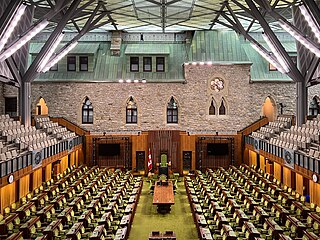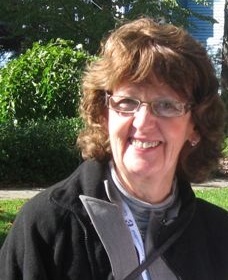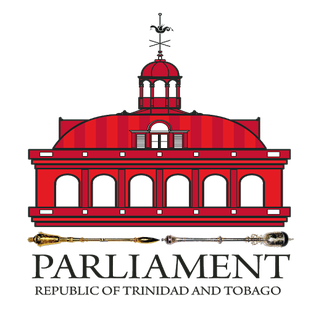Notes
- ↑ There have not yet been any senators whose surname begins with "X"
The following are lists of members of the Senate of Canada:

The House of Commons of Canada is the lower house of the Parliament of Canada. Together with the Crown and the Senate of Canada, they comprise the bicameral legislature of Canada.

The Parliament of Canada is the federal legislature of Canada, seated at Parliament Hill in Ottawa, and is composed of three parts: the King, the Senate, and the House of Commons. By constitutional convention, the House of Commons is dominant, with the Senate rarely opposing its will. The Senate reviews legislation from a less partisan standpoint and may initiate certain bills. The monarch or his representative, normally the governor general, provides royal assent to make bills into law.
A member of parliament (MP) is the representative in parliament of the people who live in their electoral district. In many countries with bicameral parliaments, this term refers only to members of the lower house since upper house members often have a different title. The terms congressman/congresswoman or deputy are equivalent terms used in other jurisdictions. The term parliamentarian is also sometimes used for members of parliament, but this may also be used to refer to unelected government officials with specific roles in a parliament and other expert advisers on parliamentary procedure such as the Senate parliamentarian in the United States. The term is also used to the characteristic of performing the duties of a member of a legislature, for example: "The two party leaders often disagreed on issues, but both were excellent parliamentarians and cooperated to get many good things done."

The Senate of Canada is the upper house of the Parliament of Canada. Together with the Crown and the House of Commons, they compose the bicameral legislature of Canada.

The 38th Canadian Parliament was in session from October 4, 2004, until November 29, 2005. The membership was set by the 2004 federal election on June 28, 2004, and it changed only somewhat due to resignations and by-elections, but due to the seat distribution, those few changes significantly affected the distribution of power. It was dissolved prior to the 2006 election.
Official party status refers to the Westminster practice which is officially used in the Parliament of Canada and the provincial legislatures of recognizing parliamentary caucuses of political parties. In official documents, this is sometimes referred to as being a recognized party.
Lowell Murray, is a former Canadian senator and long-time activist with the federal Progressive Conservative Party.
The representative of the Government in the Senate is the member of the Senate of Canada who is responsible for introducing, promoting, and defending the government's bills in the Senate after they are passed by the House of Commons. The representative is appointed by the prime minister.

In Canada, the Leader of the Opposition in the Senate is the leader of the largest party in the Canadian Senate not in government.

The 34th Canadian Parliament was in session from December 12, 1988, until September 8, 1993. The membership was set by the 1988 federal election on November 21, 1988, and it changed only somewhat due to resignations and by-elections until it was dissolved prior to the 1993 election.

The 31st Canadian Parliament was a briefly lived parliament in session from October 9 until December 14, 1979. The membership was set by the 1979 federal election on May 22, 1979, and it was dissolved after the minority government of Joe Clark failed to pass a Motion of Confidence on December 13, 1979. The dissolution of parliament led to the 1980 federal election. Lasting only 66 days from first sitting to dissolution, and only nine months from election to election, the 31st was the shortest parliament in Canadian history.

The 39th Canadian Parliament was in session from April 3, 2006 until September 7, 2008. The membership was set by the 2006 federal election on January 23, 2006, and it changed only somewhat due to resignations and by-elections. The Parliament was dissolved on September 7, 2008, with an election to determine the membership of the 40th Parliament occurring on October 14, 2008.

Marjory LeBreton is a Canadian former leader of the Government in the Senate of Canada; a member of the Canadian cabinet; and past national chair of Mothers Against Drunk Driving in Canada. She worked with four leaders of the Progressive Conservative Party of Canada - John Diefenbaker, Robert Stanfield, Joe Clark and Brian Mulroney - from 1962 to 1993 before being appointed to the Senate on the advice of Mulroney. She sat as a Progressive Conservative Senator from her appointment until moving with most of her caucus colleagues to the new Conservative Party of Canada in 2004, of which she was soon elected to Chief Whip. She served as an advisor to then opposition leader Stephen Harper during the 2006 election, which the Conservative Party won. After the election, she was named to the cabinet position Leader of the Government in the Senate. On July 4, 2013, LeBreton announced she would not continue in the position as of the next cabinet shuffle, which occurred later that summer. She retired from the Senate upon reaching her 75th birthday on July 4, 2015.

The Parliament of Trinidad and Tobago is the legislative branch of Trinidad and Tobago. The Parliament is bicameral. Besides the President of Trinidad and Tobago, it is composed of the House of Representatives, which is composed of the Speaker of the House of Representatives in addition to 41 directly elected members serving a five-year term in single-seat constituencies, and the Senate which has 31 members appointed by the President: 16 Government Senators appointed on the advice of the Prime Minister, 6 Opposition Senators appointed on the advice of the Leader of the Opposition and 9 Independent Senators appointed by the President to represent other sectors of civil society. It is at present the only parliament in the world with an incumbent female President, President of the Senate, Speaker of the House of Representatives and Leader of the Opposition and made history by appointing the Caribbean's first and only transgender parliamentarian on 15 February 2022. As of 20 April 2021, there are only 24 female members, or 32.9% and eight members born in Tobago or 11.0%.

The 36th Canadian Parliament was in session from September 22, 1997, until October 22, 2000. The membership was set by the 1997 federal election on June 2, 1997, and it changed only somewhat due to resignations and by-elections until it was dissolved prior to the 2000 election.

The 40th Canadian Parliament was in session from November 18, 2008 to March 26, 2011. It was the last Parliament of the longest-running minority government in Canadian history that began with the previous Parliament. The membership of its House of Commons was determined by the results of the 2008 federal election held on October 14, 2008. Its first session was then prorogued by the Governor General on December 4, 2008, at the request of Prime Minister Stephen Harper, who was facing a likely no-confidence motion and a coalition agreement between the Liberal party and the New Democratic Party with the support of the Bloc Québécois. Of the 308 MPs elected at the October 14, 2008 general election, 64 were new to Parliament and three sat in Parliaments previous to the 39th: John Duncan, Jack Harris and Roger Pomerleau.
Stephen Greene is a Canadian politician and an independent member of the Senate of Canada. He was appointed on the advice of Stephen Harper to the Senate on January 2, 2009, and sat as a Conservative Senator until May 2017, when Senate Leader Larry Smith removed him for his support for Senate reform proposals put forth by the governing Liberal Party. Greene then decided to sit as an "Independent Reform" Senator.
The Senate Liberal Caucus, also known as the Senate Liberals, was, from 2014 to 2019, a parliamentary grouping in the Senate of Canada made up of independent senators who were individually members of the Liberal Party of Canada and were appointed on the advice of previous Liberal prime ministers. The caucus was not formally affiliated to or recognized by the Liberal Party.